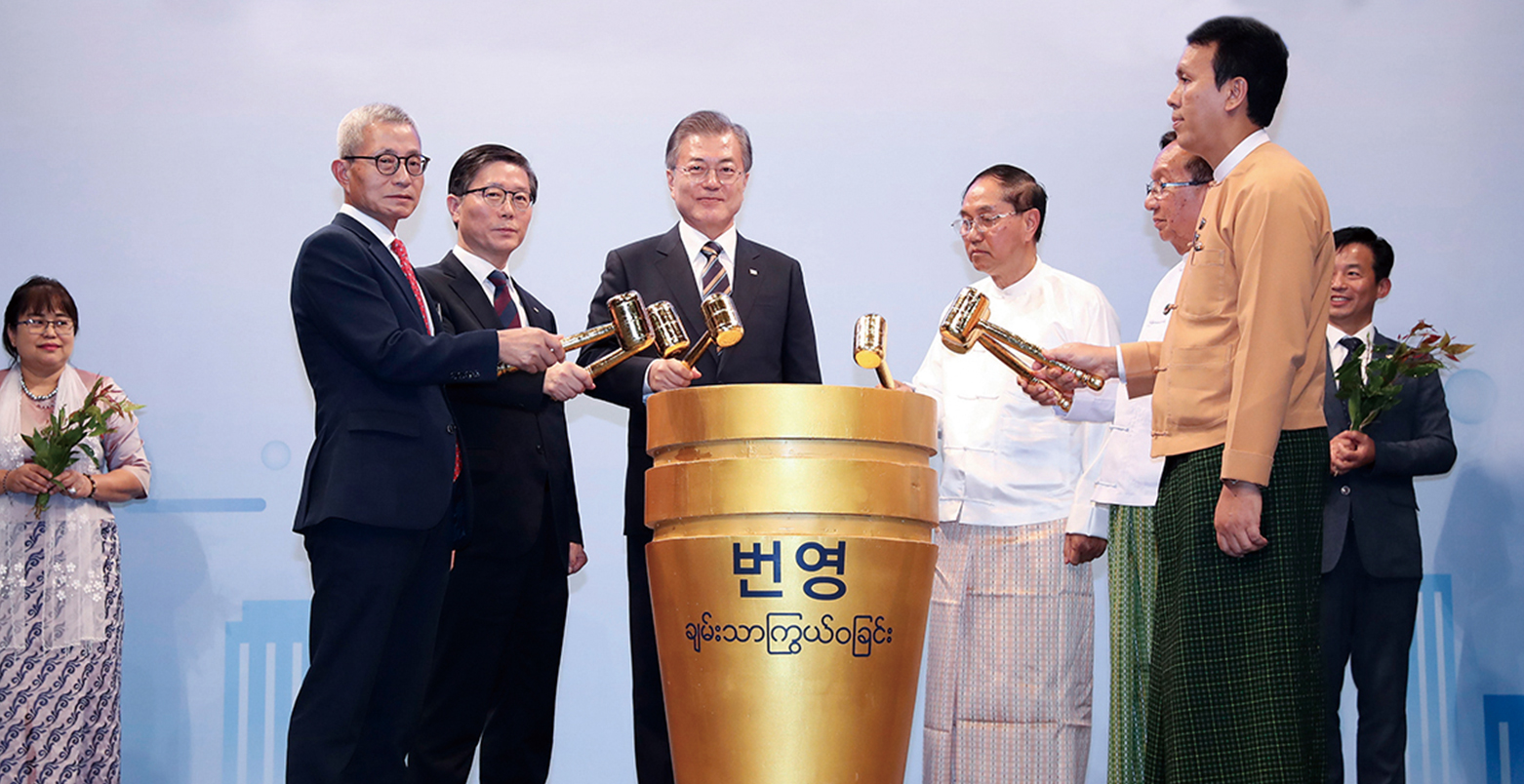
Contents










Current Korea · Written by Sohn Ji-ae Photo courtesy of Cheong Wa Dae
Reinforcing Strategic Ties
with SE Asia
President Moon Jae-in has fulfilled his promise of visiting all ten member nations of the Association
of Southeast Asian Nations (ASEAN) within his term after his visits in early September to Thailand,
Myanmar and Laos. His efforts to strengthen ties with the ASEAN bloc reflect how he values close and
cooperative partnerships with Korea’s southern neighbors, who comprise a new driving force in
diplomacy and economy.

On Sept. 4. President Moon Jae-in attends the groundbreaking ceremony for an industrial complex and a business forum held in Yangon, Myanmar.
Bilateral ties with Japan have faltered since a string of tit-fortat trade measures by both nations, and the U.S.-China trade dispute has slowed the global economy. Because of these economic crises, Korea needs to reduce its reliance on its traditional trading partners like the U.S., China and Japan and tap niche markets instead.
Since the start of his administration in 2017, President Moon Jae-in has been well aware of the need to diversify the nation’s diplomatic and economic portfolio. He has maintained his focus firmly on the nation’s southern neighbors, namely India and the 10 member countries of the Association of Southeast Asian Nations (ASEAN). This approach is called the New Southern Policy, an initiative he devised to raise Korea’s ties with ASEAN and India to the level of Seoul’s relations with the four major powers -- the U.S., China, Japan and Russia.
The president is confident that strengthened partnerships with the country’s southern neighbors, with a combined population of more than 2 billion, most of whom are relatively young in their 30s and an annual GDP of USD 5 trillion, will broaden Korea’s diplomatic and trading horizons.
Over the past years, the initiative has produced good results in trade. Cheong Wa Dae stated that the number of visitors between Korea and the two regions surpassed 11 million for the first time last year, while the trade volume between the two sides hit a record high topping USD 160 billion. Around 40 percent of the volume of orders Korean companies received last year came from the two regions.
Showing the importance of ASEAN as a valuable partner, Korea will host the ASEAN-Republic of Korea Commemorative Summit and the inaugural Mekong-Korea Summit in November in Busan. Many are convinced that these two events are crucial for further reinforcing friendly ties and planting the seeds for shared prosperity with India and ASEAN.

On Sept. 2, President Moon Jae-in checks on a Hyundai product with Thai Prime Minister Prayuth Chan-o-cha at the Korea-Thailand Business Forum in Bangkok.
Shared Vision
During his tour of Thailand, Myanmar and Laos, all situated along the Mekong River, from Sept. 1-6, President Moon said, “Korea hopes to jointly prosper with Mekong countries and expects the ‘Miracle on the Hangang River’ to lead to the ‘Miracle on the Mekong River.’”
The president also tried to consolidate Korea’s foothold in the region by making a pitch for synergy that his New Southern Policy could create in line with the economic plans of the three Mekong countries.
In Laos, the final leg of the trip, he laid out his “Korea-Mekong Vision” that seeks economic opportunities in the Mekong area, which is blessed with abundant biodiversity, and helps the region achieve development. The vision has a three-pronged approach: prosperity based on Korea sharing its developmental experience, sustainable growth, and peace and co-prosperity in East Asia.
In addition, Seoul and Bangkok agreed to expand its partnership to high-tech sectors in response to the Fourth Industrial Revolution. Korea also decided to double its aid to Myanmar through the Economic Development Cooperation Fund from USD 500 million to USD 1 billion.
President Moon says the dynamic nature and growth potential of the Mekong region will open the doors to a new economic future.
When asked by a Bangkok daily why ASEAN and India are his focus, he said, “Because, being Korea’s close neighbors, the two regions have greater potential than others for people on all sides to grow closer and work together for common prosperity,” adding, “There is plenty of room for cooperation.”
The global economy faces rising uncertainty amid the turmoil caused by Brexit and the escalating trade war between the U.S. and China. The bitter trade rift between Seoul and Tokyo also shows no signs of improving.
In times like these, the leaders of Korea and ASEAN will assemble in Busan in November, and their shared vision and collaborative partnership could make a difference in the economic ecosystem.
Other Articles















